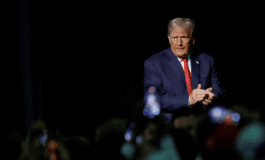ROCHESTER — Oakland University had long dreamed of bringing in a national debate, and that dream became reality as the campus welcomed the 2011 Republican debate to its O-Rena complex on Wednesday, Nov. 9.

|
|
Republican presidential candidates (L-R): former Pennsylvania Senator Rick Santorum, Rep. Michele Bachmann (R-MN), former House of Representatives Speaker Newt Gingrich, former Massachusetts Governor Mitt Romney, businessman Herman Cain, Texas Governor Rick Perry, Rep. Ron Paul (R-TX), and former Utah Governor Jon Huntsman gather onstage before the CNBC Republican presidential debate in Rochester, Michigan, November 9, 2011.
REUTERS/Rebecca Cook
|
The debate, titled “Your Money, Your Vote,” was dominated by questions surrounding the United States’ long-struggling economy but will be remembered mainly for a key slip-up by Texas Gov. Rick Perry as he attempted to answer a question about what departments he would like to cut.
“I will tell you, it is three agencies of government that when I get there that are gone. Commerce, Education, and the…what’s the third one?” Let’s see…” Perry said before a long, awkward pause, leading to laughter from the crowd as he was unable to remember.
Fellow candidate and fellow Texan Ron Paul, a U.S. Representative, jokingly suggested the EPA to which Perry responded, “EPA, there you go.”
Perry later clarified that he had been joking about doing away with the EPA. A few minutes later, he also told the audience that the Department of Energy was the third forgotten department.
Michigan Gov. Rick Snyder and Oakland County Commissioner L. Brooks Patterson were among those who introduced the candidates to an enthusiastic Oakland University crowd prior to the CNBC-exclusive broadcast.
“We want to be a role model for the rest of the country, we’ve just turned in the fastest budget in the last 30 years in Michigan and we’ve begun paying down debt on some of our long-term liabilities,” he said.
Snyder received praise from Michigan Republican leaders before being introduced, including from Bobby Schostack, the party chair.
Patterson highlighted the success of Oakland County while OU President Gary D. Russi spoke about his campus’ continued growth and contributions to the economy including in the medical sector.
The debate itself will also be remembered for questions asked by moderator Maria Bartiromo’s questioning of candidate and former pizza business and restaurant industry leader Herman Cain about recent allegations by four women that he sexually harassed them in the past.
“The American people deserve better than someone being tried in the court of public opinion based on unfounded accusations,” he said in response to a question about the accusations.
Much of the crowd also booed when the topic was brought up, as the debate was supposed to maintain a focus on economic issues.
Regarding the economy, Cain focused on his “9-9-9” tax plan in response to many questions on the evening. The plan calls for 9% flat business, personal and national sales taxes while also emphasizing the need for growth.
“We have the biggest economy in the world. And as long as we are stagnant in terms of growth in GDP, we impact the rest of the world. We must do that,” he said.
Ron Paul and Michigan native Mitt Romney seemed to receive the highest amount of support from the crowd. Other candidates included Sen. Rick Santorum, Congresswoman Michelle Bachmann and Gov. Jon Huntsman.
The housing market bubble and collapse was another hot topic on the night, which Romney touched on, saying that fixing the economy will help the market while criticizing President Barack Obama as many others did.
“The best thing you can do for housing is to get the economy going, get people working again, seeing incomes, instead of going down, incomes coming up so people can afford to buy homes,” Romney said. “You have to let the market work and get people in the homes again, and the best way for that to happen is to allow this economy to reboot.
“What we know won’t work is what this president has done, which is to try and hold off the foreclosure process, the normal market process, to put money into a stimulus that failed, and to put in place a whole series of policies from Obamacare to Dodd/Frank that made it hard for this economy to get going. You want to get America’s economy going? We know how to do it. Just do almost the exact opposite of what President Obama has done.”
Paul spoke out against the country’s Federal Reserve Bank’s policies which have created rising inflation, saying he wanted to audit and eventually dismantle the system based around a private, money-printing bank that forces the government to pay interest.
He also touched on the housing crisis.
“We face a housing crisis once again because it’s price-fixing. They’re fixing the prices of these mortgages too high, and this is why nobody will buy them.. This is why you have to get rid of Fannie Mae and Freddie Mac, sell all of that into the marketplace. And the reason they do this is to prop up the banks, because the banks have invested in Europe, they’ve invested in Fannie Mae and Freddie Mac, and these credit defaults swaps.
“They’re in big trouble, and that is why they’re getting bailed out. And that’s why they are not allowing these mortgages to go down, and that is why we will most likely bail out Europe, which will be a real tragedy.”
Many of the candidates were also asked about their repeated focus on changing tax rates and why they believed changes would be the key to fixing the economy. Former Speaker of the House Newt Gingrich said he wanted to see less regulation while also offering a critique of Obama.
“…I think most of us are for tax policies that lead to jobs because we have had two cycles in my lifetime, Ronald Reagan, and the Contract with America (a policy that he was the architect of), both of which had the same policy: lower taxes, less regulation, more American energy, and have faith in the American job creator as distinct from the Saul Alinsky radicalism of higher taxes, bigger bureaucracy with more regulations, no American energy, as the president announced again today in his decision on offshore, and finally class warfare.
“So I would say that all of us on the stage represent a dramatically greater likelihood of getting to a paycheck and leaving behind food stamps than does Barack Obama.”






Leave a Reply